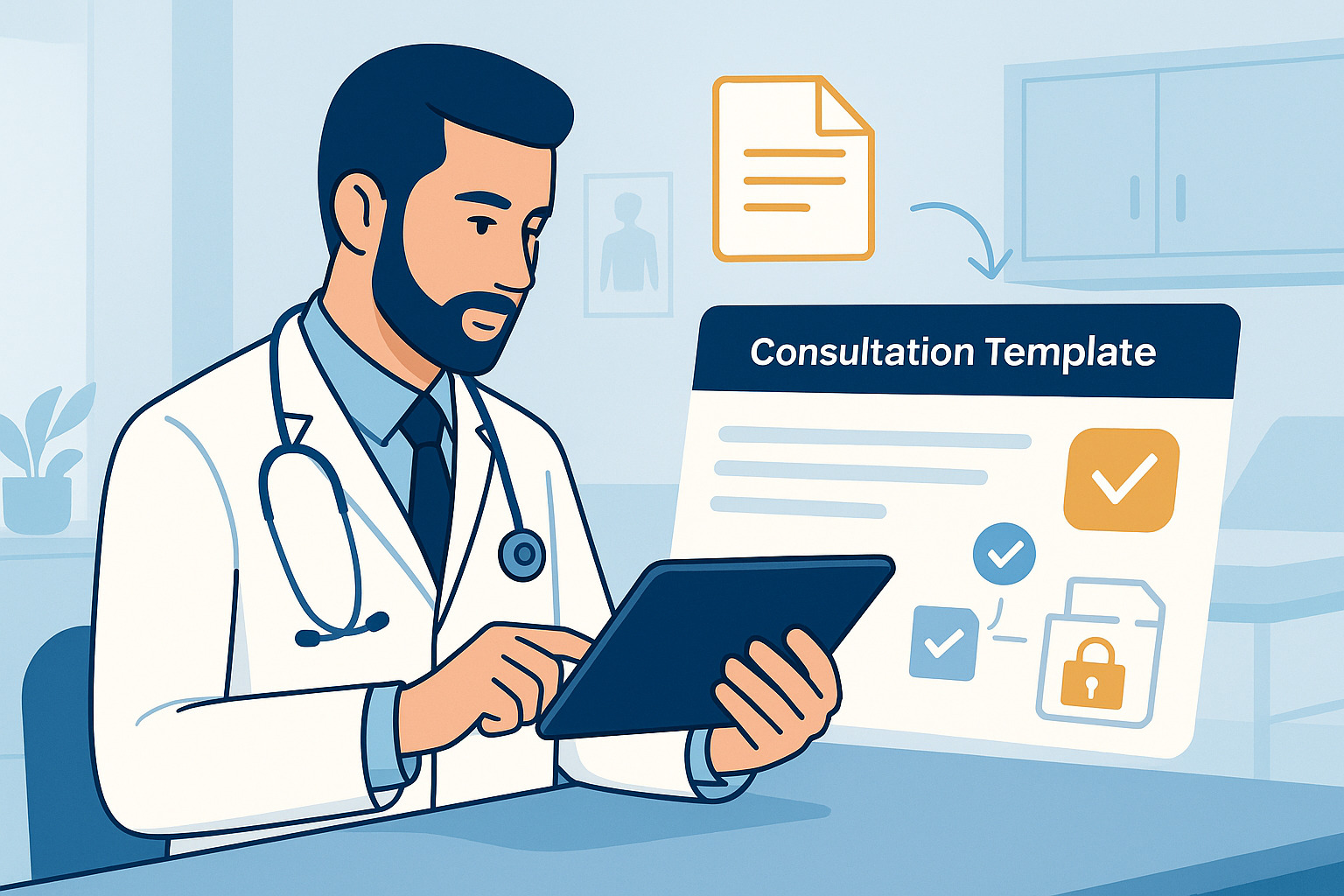Updated on: September 22, 2025
Clinical documentation is the backbone of quality patient care. Whether it’s an initial consultation, follow-up visit, or ongoing treatment, a structured documentation form ensures that nothing important slips through the cracks.
That’s why we created a free consultation template designed to streamline your documentation process. Paired with AI medical scribe support, this form helps clinicians save time, improve accuracy, and focus more on patients.
What Is a Clinical Documentation Form?
A clinical documentation form is a structured tool used to capture patient history, symptoms, assessments, and treatment plans. Instead of scattered notes, it provides an organized, consistent format for every encounter.
The main goals of a documentation form are to:
-
Standardize patient notes across providers.
-
Improve continuity of care.
-
Support billing and compliance requirements.
-
Reduce the cognitive burden on clinicians.
Why Use a Free Consultation Template?
Consultation visits are often information-heavy. Patients share chief complaints, medical histories, current medications, and lifestyle details, all of which must be documented quickly and accurately.
A free consultation template ensures:
-
Efficiency – You don’t need to start from scratch for each encounter.
-
Clarity – Information is captured in a clear, structured layout.
-
Accuracy – All critical details are prompted and less likely to be missed.
-
Compliance – Documentation aligns with hospital and insurance standards.
👉 Download the Free Clinical Documentation Consultation Template Here
Sections Included in the Consultation Template
Our free consultation form is designed to cover every essential aspect of a patient encounter:
-
Patient Demographics: Name, age, date, provider, MRN.
-
Chief Complaint (CC): Patient’s main concern in their own words.
-
History of Present Illness (HPI): Onset, duration, severity, and related details.
-
Past Medical & Surgical History: Relevant background health information.
-
Medications & Allergies: Updated medication list and allergy status.
-
Family & Social History: Lifestyle factors and genetic predispositions.
-
Review of Systems (ROS): Organized by body system.
-
Physical Examination Findings: Head-to-toe structured layout.
-
Assessment & Plan: Diagnosis, follow-up actions, referrals, and patient education.
This structure keeps consultation notes thorough and easy to navigate.
How AI Medical Scribes Improve Consultation Documentation
Templates help, but AI medical scribes like DocScrib take efficiency even further. Instead of manually filling out every section, DocScrib can:
-
Listen in real time and capture consultation details.
-
Auto-populate structured templates with patient history, ROS, and exam findings.
-
Customize forms to match your specialty or hospital workflow.
-
Push notes directly into your EHR, cutting out duplication.
-
Ensure compliance and completeness by automatically checking documentation fields.
For example, a physician could focus on conversation while DocScrib fills out the consultation form—ready for review before the patient leaves the room.
Explore our related resource: SOAP Notes Template with DocScrib AI Assistance.
Best Practices for Clinical Documentation
To get the most from your consultation forms:
-
Document in real time whenever possible.
-
Highlight abnormal findings clearly for follow-up.
-
Use patient’s own words in chief complaints.
-
Standardize abbreviations to avoid miscommunication.
-
Leverage AI support to reduce manual data entry.
By following these practices, clinicians can create consultation notes that are both efficient and clinically valuable.
Related Resources for Clinicians
Start Using DocScrib Today
Whether you’re documenting a first-time consultation or managing ongoing visits, DocScrib helps you streamline documentation with AI-powered support.
📌 Ready to see it in action? Book a Demo with DocScrib today and experience smarter consultation documentation.
Final Thoughts
Accurate and efficient consultation documentation is essential for safe, high-quality patient care. With a free consultation template and the support of AI medical scribes, clinicians can reduce documentation burden while improving care delivery.
👉 Download the Free Clinical Documentation Form: Consultation Template today and take your documentation workflow to the next level with DocScrib.
